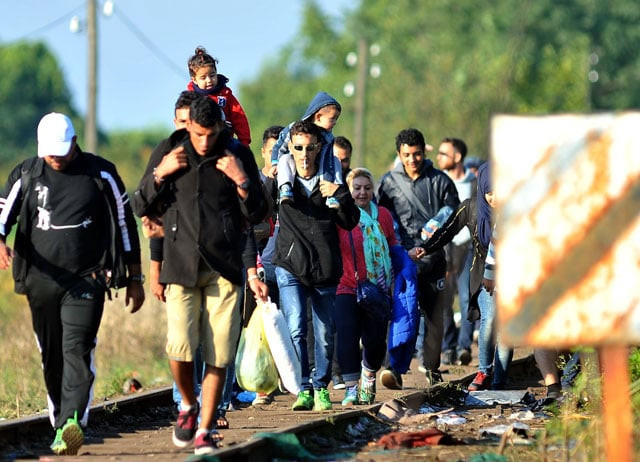Refugees in Hungary run gauntlet of smugglers, police and closing borders
The only other option for refugees is to walk several kms, running a gauntlet of police patrols and brutal smugglers

Refugees from Middle Eastern countries walk on railway tracks to the Hungarian border near the Northern Serbia's town of Horgos on September 14, 2015 before Hungary seals its border on September 15. PHOTO: AFP
The 20-year-old Afghan arrived at the crowded and filthy transit camp just inside the Hungarian border on Sunday night.
He was just in time -- by Tuesday, authorities say this border crossing will be shut.
But then he got news from his uncle in Berlin that Germany had reinstated border checks. He needed to keep moving in case the controls became permanent.
"I cannot wait here. Time might be running out," said Fayik, a slight and smiley figure who can speak five languages.
"I don't like doing illegal things, but sometimes there is no choice. I have been very quick. I have to continue to be quick," he said.
At the time, hundreds were waiting for police buses to registration centres that appeared to have stopped running for the night. Besides, Fayik worried that registering with police meant he could only apply for asylum in Hungary.
But the only other option was to walk 20 kilometres to the nearest train station -- running a gauntlet of police patrols and brutal smugglers.
"There are hundreds of smugglers. They are very bad guys," warned Matthias, a young Austrian volunteer manning the access road out of the camp.
"They will drive you a couple of kilometres, then put a knife to your throat and take all your money," he warned Fayik and a group of other Afghans.
Read: Hungary calls for migrant aid as EU nations squabble
As he talked, Matthias was also trying to control the cars entering the site. Some were aid workers or press, but a few were smugglers trying to get closer to their prey.
Suddenly, a station wagon accelerated and swerved round him.
Matthias radioed to his colleagues down the road: "A smuggler just broke through," he said. It was not clear if the over-stretched volunteers at the other end would be able to do much about it.
'Dangerous and adventurous'
Hungary has said it will seal its border on Tuesday and start arresting illegal entrants.
Ironically, this is what finally convinced Fayik's parents to let him risk the sea crossing from Turkey to Greece -- "the most dangerous and adventurous thing I have ever done in my life" -- since they feared this could be the start of wider border closures around Europe.
Read: Video shows refugees fed 'like animals in pen' in Hungary camp
The family fled the Taliban for Turkey a year ago, but unable to work, Fayik could not continue his studies in trade and finance.
"In Europe, I can work and pay for my own studies," said Fayik.
With a few hundred euros from his family, and a run of good luck in catching buses and evading police, Fayik made it from Turkey to Hungary in just five days.
The poorer and less fortunate often take weeks to get this far, but there is a desperate rush to beat the border closures. Hungary said a record 5,683 migrants crossed here on Sunday, including 931 children.
What happens next?
Eventually, Matthias convinced Fayik to walk back to the transit zone, rest for the night and get to the station in the morning.
Read: In search of a better life: Pakistani migrant dies in Hungary
"Before we were taking people secretly at night to the train station to avoid police, but now the police are just letting people leave," said Matthias.
Volunteers have set up a reasonably well-equipped camp at the transit zone, with tents, food, clothes and medical facilities.
"I'm so tired. Maybe I can sleep for a while," said Fayik, heading back towards the camp.
On Monday morning, there was good news.
The police buses that had been taking people to registration centres were running again, but were now taking people straight to the train station and putting them on trains destined for Austria.
"This is great," Fayik told AFP over the phone. "But I'm not sure what happens next. If Germany is full, maybe I will have to try another country. Maybe Finland will let me come. We will see..."



















COMMENTS
Comments are moderated and generally will be posted if they are on-topic and not abusive.
For more information, please see our Comments FAQ